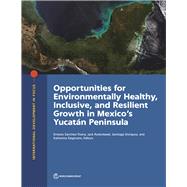Opportunities for Environmentally Healthy, Inclusive, and Resilient Growth in Mexico's Yucatán Peninsula
, by Sánchez-triana, Ernesto; Ruitenbeek, Jack; Enriquez, Santiago; Siegmann, Katharina- ISBN: 9781464813573 | 1464813574
- Cover: Paperback
- Copyright: 1/30/2020
Approximately 4.1 million people live in the three states of the Yucatán Peninsula: Quintana Roo, Yucatán, and Campeche. Some 30 municipalities are in a coastal territory of almost 2,000 linear kilometers, from the oil fields of the Gulf of Mexico to the world-renowned beaches of Cancún, just north of the second-largest barrier reef in the world. The peninsula's natural assets also include notable Mayan temples. With poverty far from eliminated, and with economic development opportunities beckoning in agriculture, manufacturing, and hydrocarbon development, the region is under growing risks from environmental hazards. Oil spills, hurricanes, coral bleaching, extreme flooding, and erosion have all been experienced in this region over the past decade.
Based on preliminary identification of environmental priorities, Opportunities for Environmentally Healthy, Inclusive, and Resilient Growth in Mexico's Yucatán Peninsula explores selected topics that aim to inform decision making in the region. A general context of integrated coastal zone management is used to explore issues, constraints, and potential solutions, and the role of geomorphology is examined with a view to identifying how shore management plans can contribute to improved coastal management. Economic studies find that the main environmental health risks in the peninsula result in more than 1,000 premature deaths every year and in more than 9.36 million days lost to illnesses. These risks generate substantial economic losses, representing 2.2–3.3 percent of gross regional income. Scenarios relating to the economic cost of extreme weather events generate similar levels of damages: 1.4–1.5 percent of GDP in 2020 and 1.6–2.3 percent of GDP in 2050. A social accounting matrix examines the social and environmental interconnectedness to the various parts of the economy, and an institutional analysis considers the mandates of existing institutions in the states, and of the contribution that regulatory measures may make to environmentally sustainable development without undermining economic growth prospects.







